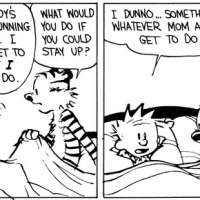Introverts, extraverts and sociopaths
My recent posts have been of a more sciency (or science fictiony) nature, focusing more on technical and philosophical issues rather than interpersonal ones. This is something I aim to rectify with this post, addressing a subject that might be well-known to people who have a substantial portion of their friend-base online.
I’m an introvert. This means that although I can function reasonably well in social situations, I don’t revel in prolonged exposure to humans. In fact, it exhausts me. It’s not to say that I don’t appreciate humans – or at least a subset of them – but rather that I need to recharge on a regular basis, and that my method of recharging is being on my own.
Introversion
So, this ‘introversion’-thing then. What’s that exactly? Well, most commonly it’s defined as one of the poles of the extravert spectrum in the five-factor model. The spectrum goes from introvert to extravert, with a gradient of intermediaries in between*.
Being an introvert means that you’re less dependent on external stimuli in order to be content. Introverts spend time alone, within their own minds, exploring topics, ideas and questions. They don’t feel the need to assert themselves in social situations and are generally perceived as reserved and low-key.
It does not mean that introverts necessarily are shy, or unfriendly, or anti-social (although they can be, I guess – just like any other person). It does however mean that they need some down-time in order to recharge and de-stress.
Extraversion
On the opposite side of the spectrum we find the extraverts. An extravert is outspoken, gregarious and very social. In fact, extraverts turn social activities to get their mental energy – hence the label ‘extravert’: to turn (vertere) to the external (extra). The extravert is often perceived as enthusiastic, active and energetic.
The less attractive traits of an extravert would be the tendency to hog attention, asserting themselves at the cost of others and quickly becoming bored when alone. (If someone you don’t know strikes up a conversation with you on the bus or at the store, chances are that it’s a bored extravert.)
Sociopathy
Even though both sides of the spectrum are perfectly sound ways of managing one’s mental energy, there are pathological consequences lurking in the shadows. At the extreme ends of each pole, we find behaviours that are destructive, both to the individual and to his or hers surroundings.
On the introvert side, when taken to extremes, we find a phenomenon that in Japan is called Hikikomori: people who shun all social interactions, live in complete isolation and conduct all necessary transaction online. They cut off real-world contact with other people, including their own families, and only engage in online activities. It’s also there that they order their food and anything else they need, having it delivered to the door and then wait until no one is around before collecting it.
A Hikikomori has a phobic fear of real-time social life, usually stemming from a sense of lack of control. Other people are perceived as mean and spiteful, or at least rude and inconsiderate, and are better handled in a controlled environment online. As extremely sensitive people, being around other people is physically painful and could even result in severe panic attacks.
Hikikomori can be very distressing for the relatives of the person. It’s like someone disappears completely, even though they’re still there. In extreme cases, it can be years between seeing the Hikikomori in real life.
On the other side of the spectrum, extraverts also risk ending up with sociopathic behaviours. An extreme extravert – something that doesn’t seem to have a name or a label, but that I’ll call extremavert for convenience – shows an unsound fixation with external gratification. The desperately need to take the centre stage at every opportunity, be it appropriate or not, in order to loudly proclaim their opinions on every matter under the sun. If they for some reason are unable to do that, they will start to hum or make other loud noises instead. They just cannot be quiet.

Pathological need for attention, as illustrated in Southpark’s ‘The F-word’ episode**. Brub. Brrub brrub. Brub brrub brrrrub.
This leads to them always being in focus of any discussion or gathering, and they further enforce that by trying to give the impression that they are experts on the matter at hand. The conflicts and dramas that often follows serve the purpose of creating a distraction from the nagging thoughts and doubts they feel. Anything to stop them from thinking, and anything to assert that they’re not worthless. At the centre of an extremavert’s mind is a deep black hole of need; a need that can never be fully satisfied.
Again, this has consequences for friends and relatives. The egocentric self-focus of the extremavert puts heavy strains on relationships, not seldom resulting in them crashing all together.
Meeting the norm
We all live in societies. Those societies consist of people, which makes social interactions inevitable. Here, the extraverts have an advantage. Not only are they easy-going, talkative and assertive, but they never tire of social interactions, since that’s how they recharge. They easily get to know new people, and introduce themselves to new groups. Heck, they often end up taking over the group all together. They’re the born ring-leaders, quickly assembling a following of less confident people.
The introverts on the other hand don’t do any of those things. Instead they play the long game. They think before they talk, and they talk less. They observe and analyse. They don’t take over groups but rather orbit them, preferably at a slight distance. Often friendly enough if directly addressed, introverts tend to make the odd remark or comment but otherwise stay out of the more heated discussions at the centre of the group.
Since outgoing people often end up in leading positions, they’ve turned into the norm, what we should all strive to be. After all, everyone loves a winner, right? “Why can’t you be more sociable and outgoing? Just look at Steve, he’s always the life of the party. He’ll go far, I’m sure! You should be more like Steve.”
And suddenly introverts are something else than people with a particular type of personality. They’re somehow ill, broken, and need to be made whole again.
The hidden mass
Since extraverts are naturally loud, their opinions are always heard. Introverts have to go against their natural behaviour to get their points across. This has led to extraverts dominating our western societies and setting the rules for ‘proper’ conduct. We either all play by those rules or risk being perceived as weird or abnormal. It truly is an extravert’s world out there.
My main problem with that is not that introverts are being subdued, but that the majority of voices in our societies end up being from people who don’t like to sit down and ponder. And how can we validate our opinions and views if we never stop to think and analyse? This would no doubt lead to a short-sighted and chaotic world – which, to be fair, is more or less what we have today.
If I sound biased and judgmental towards extraverts it’s not just because I’m an introvert myself but because I tend to root for the underdog. It just doesn’t feel right and proper that one group should be allowed to dictate if another group is behaving correctly or not, just because they’re louder.
Introverts and extraverts make up roughly equal amounts of the population. This means that for each extravert there’s an introvert. This shows that introversion and extraversion both are equally valid approaches, and that neither one is ‘wrong’.
Conclusion
The world is as it is. No point sitting around whining about it. But that doesn’t mean we can’t change it if we want to. With half the population being on the introvert side of the spectrum, it follows that this character trait must be good for something – or, at the very least, not harmful in any way. After all, introversion isn’t an illness, something to be cured***. It’s just a particular personality trait, like enjoying spicy food or preferring cats over dogs.
What introversion can contribute with is a quiet contemplation, a second thought, a last think-through before jumping into action. If we could learn to value those qualities in our society as much as we value the action-oriented outgoing qualities of the extravert, we could all be living in a more thoughtful and prudent world.
I want to end this post with something a fellow introvert said to me recently: “Why is it that introverts always seem to understand how extraverts work, but extraverts never seem to get how introverts work?”
Yes. Why indeed?
* If you don’t identify with either the descriptions of introverts or extraverts – or indeed identify with both of them – you might be an ambivert. This means you’ll find yourself on the middle of the extravert spectrum, and exhibit traits from both poles.
** I’d love to link to this clip, but for legal reasons there’s a different URL for each jurisdiction. Anyway, here are the links for some of the available regions: USA, UK (not the same clip, but good all the same), Sweden, Finland and Germany.
*** Case in point: this article suggests that we should worry about babies being born underweight, since they are “more likely to be neurotic and introverted”. Parents need to be warned so that they can do all they can to transform these unfortunate kids from horrific introverts to lovable extraverts.



















As a teacher of teenagers, it is the ‘extremaverts’ in my classes that do my head in…. I’m quite fond of my introverts 😉
LikeLike
Ha! Yes, teenagers are perhaps the ultimate extremaverts. Which is perhaps understandable considering the changes they go through, personality-wise. What’s sad is people who never get over that stage of development and stay like that all their lives.
LikeLiked by 1 person
Cool article. Where did you get the equal numbers of extroverts and introverts statistic from? The Introvert Advantage (http://www.goodreads.com/book/show/49322.The_Introvert_Advantage) claims 3:1 extroverts to introverts in the general population though I don’t remember what she cites for that figure.
LikeLike
Thank you! I have to check, but it’ll have to wait until I’m on my laptop again. I think however, that detection of introvert personalities will always have a large margin of error, since introverts rarely make themselves known. Therefore, any estimate is bound to be a bit off the actual ratio and most likely an underestimation.
LikeLike
Ok, better late than never: It was from http://introvertzone.com/ratio-of-introverts, referring to the Meyer-Briggs 1998 Manual. It’s only quantifying the US population though, but even so it’s interesting to note that an outgoing and extravert country as USA is still sitting on a 50/50 split of the spectrum.
LikeLike
Oh cool, it explains the origin of the 3:1 figure too. Thanks!
LikeLike
I love this. You did an AMAZING job with this one.
I think a lot of introverts (like Marilyn Monroe) are the type that people would be surprised about. I’m that type. You wouldn’t know, unless we’re close, that I am one (well, you’d know, as we are close) because I SEEM to be very extroverted. I do well at work. I take charge of things. I can talk to people, even large groups, when I have to, and I have no problem getting on stage. But I need a LOT of recharge time, and I never really enjoy those things…I can just act like I’m ok while I’m doing them. I can put on the extrovert face that the world needs to see (because ew ew ew! INTROVERTS! Get them out of here!)
I think a lot of the great, quiet things in the world, however, are accomplished by introverts. The art. The writing. The music. The things that take a little extra time and a little extra introspection. The world needs both of us to balance it out – the quiet ones to create, and the loud ones to shout about it.
And then the people like me, who can be one while really being the other, I suppose. We’re the tricky ones.
LikeLike
Thank you so much! I’m very glad you liked it.
Yes, I too can do the extravert-thing. Working as a teacher has taught me that. I find it easier if taking on a role though, like the Teacher one, or the Presenter one for instance. It allows me to lose less energy somehow.
And yes, it’s true that the world needs both types. Like Charles Darwin, with his meticulous research and creative ideas, and his friend Thomas Huxley (‘Darwin’s bulldog’) to spread the message and get the new ideas out into the world.
LikeLiked by 1 person
I’m introvert, I don’t belive in this “recharge battery” thing, I think it’s internet myth and pseudo-science. Before internet we didn’t had any “batteries” or whatever.
And now everyone suddenly have batteries
LikeLike